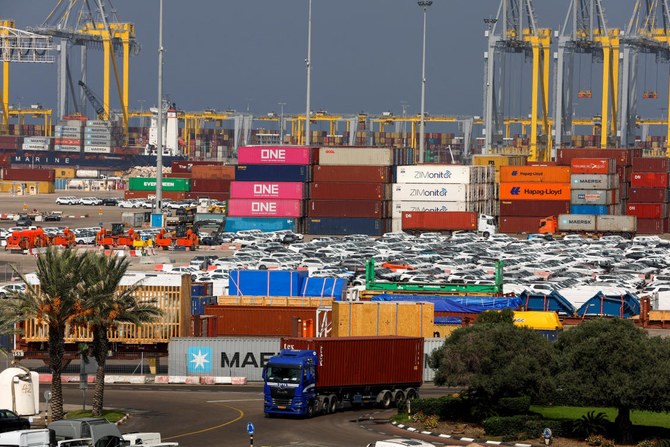JERUSALEM/LONDON: Israel’s government-run port of Ashdod has complained that a rival Chinese-run terminal at the northern port of Haifa has become a strategic risk during the Gaza war.
In a letter seen by Reuters, the chairman of the southern Israeli port warned the head of Israel’s shipping and ports authority about the actions of countries designated by the West as an “axis of evil,” and said China was among them.
Though close to Gaza and in range of rockets fired by the Palestinian militant group Hamas, Ashdod port has stayed open during the war in the coastal enclave.
But it suffered minor disruptions at the start of the nearly four-month-old war, and three ports in Haifa, one of which is run by China’s SIPG, have received any extra cargo during the conflict.
Chinese container shipping lines COSCO and OOCL have suspended trade with Israel since Yemen’s Houthis said they were targeting ships in the Red Sea linked to Israel, Britain or the United States in a show of solidarity with Hamas.
“In practice it (China) is maintaining a trade boycott on Israel,” Shaul Schneider, chairman of the board of directors of Ashdod Port, said in the Jan. 17 letter.
He said Ashdod Port would halt information-sharing with the SIPG terminal and would no longer be a full partner in the sector’s “sensitive situational assessments” that discuss emergency scenarios and “strategic threats.”
The decisions taken by COSCO and OOCL in the past few weeks dealt a blow to Israel’s position as an international trade hub. Should others follow suit, it could seriously harm the Israeli economy, which relies heavily on seaborne trade.
Israel’s shipping and ports authority chief replied to Schneider’s letter the following day. In his response, also seen by Reuters, he said he was surprised by the letter and called it “inaccurate to the point of being wrong.”
It could cause “serious damage to Israel’s seaborne trade and foreign relations and even damage the war effort,” he said.
He said his authority cooperated with all Israeli security agencies and that SIPG’s local subsidiary was a regulated Israeli company. COSCO’s decision to halt Israel operations, he said, was “a business decision.”
Israel’s transport ministry, which oversees the ports, has previously said it us seeking to clarify COSCO’s move.
CONCERN ABOUT CHINESE INVESTMENT
Israel has brought in global operators in recent years to run some of its ports in an efficiency drive designed to attract new trading partners. Ashdod is the last to remain state-owned.
While Ashdod and Haifa ports have been vying for market share, their rift highlights Israeli maritime concern about whether the Chinese investment is a security risk. The United States has expressed concern over the investment.
Haifa’s Bayport Terminal, controlled by SIPG, told Reuters it “follows clear rules during an emergency, as other port terminals in Israel, and acts under the instructions of the Israeli authorities.”
Asked whether it received any instructions during the war from the Chinese government, Bayport said its “business activities and goals are guided by its management and board of directors.”
“The cargo volume in Israel is significantly affected by the current situation and the security risks. We obviously can’t estimate when things will get back to normal,” it said, adding that the terminal “stands ready to support shipping companies, importers, exporters, and the Israeli economy, both in times of prosperity and crisis.”
Regarding the Ashdod Port chairman’s letter, Bayport had earlier said: “Unfortunately, there are those who are exploiting the situation these days to hurt competition and return the seaports in Israel to the days of a government monopoly.”
COSCO and SIPG in China did not respond to requests for comment. Hong Kong based OOCL separately did not respond to a request for comment.
“China has always supported its companies and citizens in conducting normal trade exchanges with all countries including Israel,” China’s foreign ministry said in a statement.
China avoids being a direct party in any military conflicts, but has called for an authoritative Israeli-Palestinian peace conference and a timetable to implement a two-state solution.
SWELLING COSTS
The Israel-Hamas war began after gunmen from the Palestinian militant group killed about 1,200 people and took about 240 in an attack in southern Israel on Oct. 7, according to Israeli tallies. Palestinian health officials say more than 26,000 people have been killed in Israel’s retaliatory military campaign in Gaza, which it says is intended to wipe out Hamas.
Denmark’s A.P. Moller Maersk and Switzerland’s MSC, the world’s biggest container lines, continue to sail to Israel. Taiwan’s Evergreen line has temporarily halted “accepting Israeli cargo.”
Some merchant ships sailing close to the Red Sea are saying on their tracking positions that they have no relation to Israel or the United States, shipping data showed.
An Israeli official told Reuters the ports were protected by air defense systems, adding: “All the missiles that passed the (US-led) coalition (warships protecting shipping), we took them out in the Red Sea.”
He said Hamas strikes had not had a huge effect on Israeli infrastructure but that it would be “a very different story” if the Lebanese militant group Hezbollah “joins the party.”
Ashdod has also faced other challenges.
Both it and another port in Haifa saw their traffic cargo drop in 2023, while traffic cargo more than doubled at the SIPG controlled terminal in Haifa.
Since the start of the year, ocean freight rates had almost doubled by Jan 22 for a 40-foot container sailing from Shanghai to Ashdod, according to global freight platform Freightos. Unions have warned about the risk to mariners at sea.


























